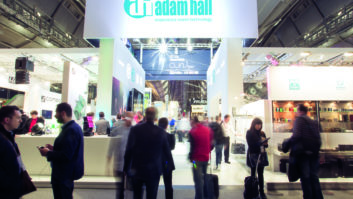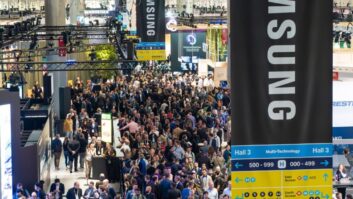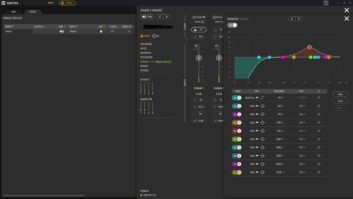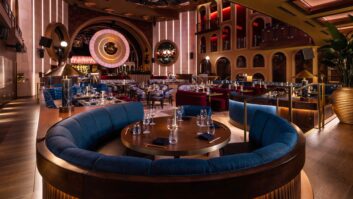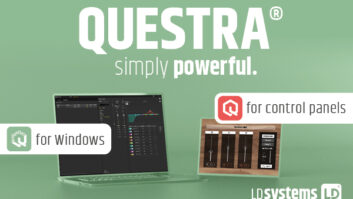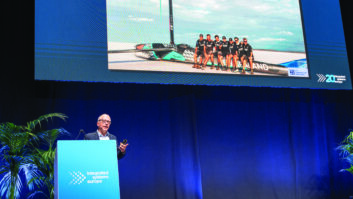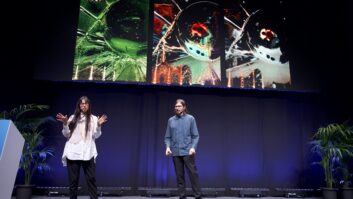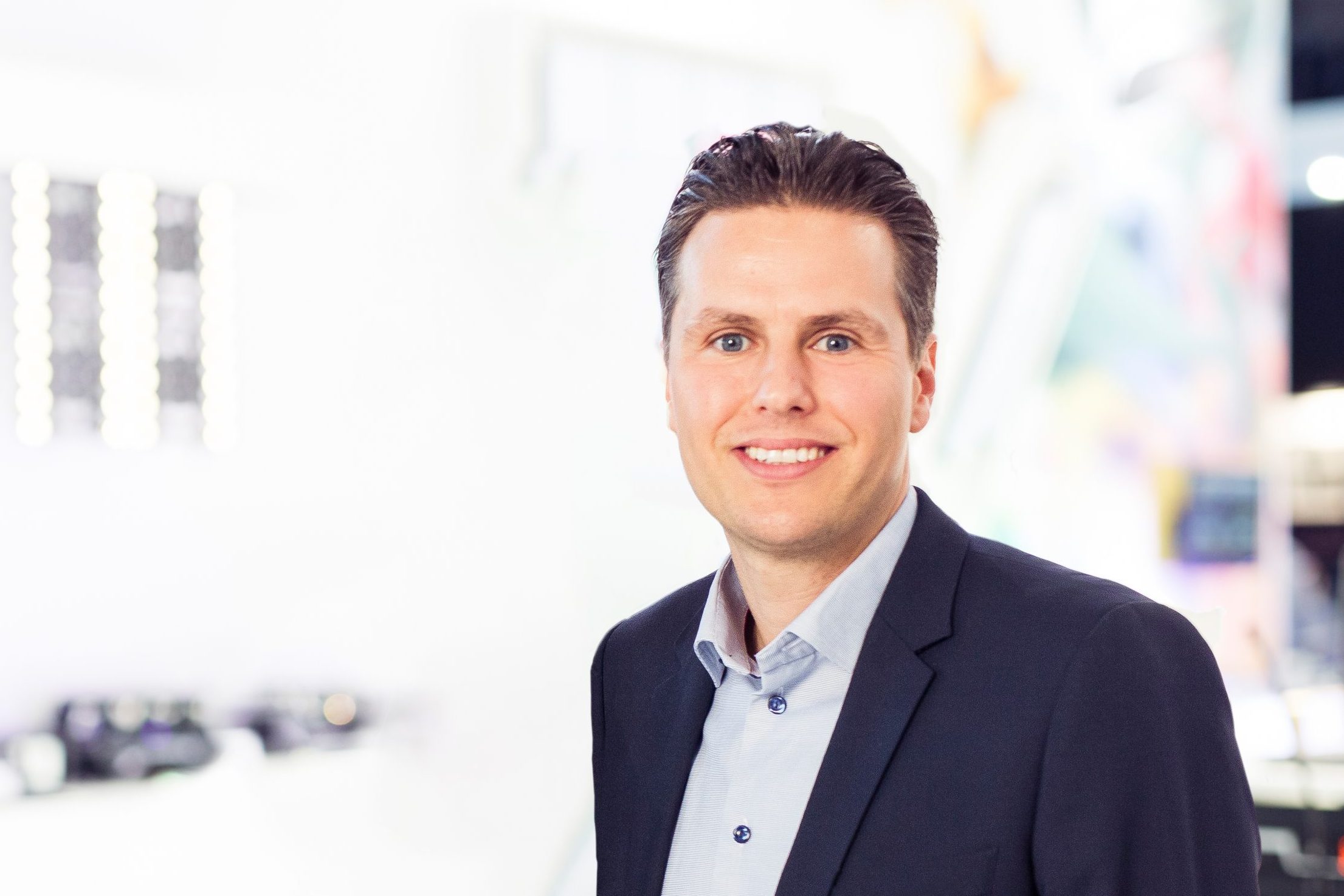
Adam Hall is a 40-year-old company, rooted in event technology, that has expanded in recent years into the installation space. Paddy Baker talked to its CEO about attacking new markets, succession planning – and how a company that began in Southend is now headquartered near Frankfurt.
When you hear the name ‘Adam Hall’, what do you think of? A UK manufacturer of flight cases? A German company that chose an English-sounding name? Or even an American ice-hockey player?
These are all aspects of the “diffuse picture” of the company that exists, particularly outside Germany, says CEO Alexander Pietschmann. Here’s the real story. The company was founded in 1975 in Southend-on-Sea, 60km east of London, by Adam Hall – “he really exists!” laughs Pietschmann – and began by making flight case fittings. In 1980, Dave Kirby, an English musician whose band played a lot of gigs on US military bases in Germany, found that “no-one else here was offering parts for building flight cases”. So he founded Adam Hall GmbH, which expanded into other products, including DIY loudspeakers and audio accessories. After a few years, “it got better and better and the German company grew faster than the English one, so Dave bought Adam out and took over.” Adam Hall GmbH is headquartered in Neu-Anspach, about 40km north of Frankfurt.
Pietschmann’s connection to the company goes back a long way. “My father Tilo was the first salesman at the company after Dave – he joined in 1987,” he explains. “He’s a musician – I grew up in an artist family in East Germany, behind the wall – he was like a rock star for the Communists, always on tour in the Eastern Bloc. So that was my connection to music, and after my father entered the company there was always a connection to Adam Hall and to Dave.” Today, Pietschmann Senior is still an Adam Hall salesman, aged 64.
At university, Alexander studied business and law, and set up an event company running student parties. “Then we got requests from companies like Pricewaterhouse Coopers and agencies that wanted to advertise in student environments to catch the best talent at an early stage. Then we got connections to companies, and did corporate events, and then it turned into a restaurant and a nightclub in Frankfurt – which of course is nice when you’re young, but after a few years your audience becomes too old to keep coming.”
Product development
He sold his company, completed his studies and joined the Adam Hall Group. “I entered the company in 2006, and we were developing more brands. I took care of our branding and product development. In the ten years from the mid-90s to the mid-2000s it was OK to buy products from Asia and put your logo on them, maybe do some quality checks, but I could see that it could not go on like this much longer. You need differentiation, USPs and development power in the product.”
So the company started R&D and marketing departments, and over the next few years created new brands in the event technology and retail markets, such as Cameo (lighting) and Gravity (premium stands). Today, the company’s portfolio also includes loudspeakers, power amplifiers, cables and cable protectors, and stage systems. Overall the Adam Hall Group has more than 7,000 products in its warehouses, and has market presence in Europe, Asia and North America.
The company no longer owns manufacturing facilities for any of its brands. “In these times it’s more about design and R&D than manufacturing,” says Pietschmann.
In the 1990s the company had a head start building relationships with manufacturers in China and Taiwan because it had already set up purchasing and quality offices there. “We were manufacturing parts, and we asked the people what kind of electronics we could do there.” Back then, he says, not speaking the local language was a real barrier to doing business in the Far East. Moving into electronics manufacturing led to the creation of the Link Dynamics loudspeaker brand, which became LD Systems.
Succession plan
In 2010 Pietschmann became a member of the Adam Hall executive board. As part of the succession plan, he became CEO in 2013 and his colleague Markus Jahnel took the role of COO. The pair purchased shares from Dave Kirby as part of an MBO, and Kirby stepped by from day-to-day matters, taking the role of executive chairman.
“I always say we have a ‘start-again’ atmosphere. Not a start-up, because we were founded in 1975, but a start-again because we have a new generation and new ideas.”
Those new ideas have clearly paid off for the ‘start-again’ business. “We can say it’s successful now – when I took over with Markus we were had a €30 million yearly turnover, and now we’re doing €74 million.”
Adam Hall’s move into the installation sector came about, like many other developments in its history, from customer requests. “There’s always a connection in these customer groups with installation: rental companies got enquiries from their customers: ‘Can you also do my meeting room?’ Or electrical companies who buy 19in racks from us – they asked us why we didn’t offer in-wall loudspeakers, and so on.”
So, four years ago, “we started with a small portfolio to get some experience in this market – and we also took over the exclusive distribution for Audac in Germany and Austria.”
He describes expanding into new markets as “a chicken-and-egg problem: people will ask for products, then you say, ‘But do you need technical planning from us?’, or they say, ‘Do you have someone who can come out and help us with an architect?’ or whatever. You need to build up everything in parallel to make an interesting offer for your customers.”
The company sells to four customer segments: industrial, rental, retail and now installation. In many cases, however, products can be marketed to more than one segment, such as LD Systems’ CURV modular array speaker system: “It started in the retail market but we always had installation people in mind, because we saw that these small aluminium cubes are exactly what someone making an installation in a shop or a fashion store would like: he wants to hide stuff, the architect wants it clean and in their colour, it can be controlled from one point, and there are no cables.”
The integrated systems business has reached the stage where it is “a serious offer”, he says: it has a dedicated product management team; in-house sales people can help customers with technical planning; and marketing staff can assist with technical specs such as simulation data.
“We want to make it clear: we don’t want to offer solutions for stadiums and churches with 20,000 people. What we want to do is small to mid-size locations: restaurants, supermarkets, small sports halls, hotels, smaller clubs.” The main advantage of being in this market space, he says, is that the company can assist integrators with technical planning, and there is more natural overlap with the retail and rental channels: “They also want to have plug-and-play products that are easy to set up.”
That’s not integrators’ only requirement. “In the installation market it’s about margin. They want to be trained on the products. They don’t want any service issues. And it’s a more conservative market – it’s not people adapting very fast to new solutions. They ask more technical questions – they want to be 100% sure that what they are choosing works long-term.”
Integrated systems are responsible for less than 10% of Adam Hall’s turnover. “So that’s about €7 million – but we are still growing steadily in this segment,” he says.
A major project occupying him at the moment is the creation of the new Adam Hall Experience Center at the company’s headquarters. This will consist of three parts: the first is a showroom area, where products can be tried out live, including training rooms and an 800-seat event theatre. “It’s not just about training on our own products – I want to offer training on things like social media, so an install company, or a rental company, can get some knowledge about how to present their company and make it appear more professional.” Then there will be the R&D department, with testing rooms, audio simulation laboratories and prototyping workshops with 3D printers – so concepts can be created quickly and discussed with the customer in the same building. Finally there will be employee areas, including a restaurant (“my restaurant is back!”) and a recreation area with table football, pinball, karaoke – “a little bit Silicon Valley”.
The right people
As CEO, Pietschmann sees one of his key responsibilities as “getting the right people on board”. Fortunately, this seems to be working: “There is less fluctuation [in staff] now. We have some very long-term people – every month we have a 10, 20 or 25-year anniversary – but we’ve doubled our employees, so we also have a lot of young people on board with another approach.”
Nowadays young people are more choosy about where they work, he says, and graduates in engineering and related disciplines are not plentiful. However, Adam Hall is one company that people want to work for.
He recounts the story of when Adam Hall offered a job in R&D to a young man who then also received an offer from BMW in Munich, where he lived. “I said to our HR manager: ‘What shall we do now? We cannot give more money, and we’re not in Munich’ – and Munich is a nice place.” [It’s over 400km away.] “But he came to us – he moved – and he told me that his project would have been to modify the sound of the doors on the new 7 Series. The car is made from aluminium and they wanted to make the doors sound heavier.” And why did he turn BMW down? “He said, ‘This is not something that I want to tell my kids, at the end of my life, that I did.’
“So it’s changing a lot. Young people don’t work only for money – they work with a purpose. They want to work for something that makes a difference. In our market we have different segments – music and rock ’n’ roll – and we can attract these people to come on board to make these products happen.”
Although the company clearly listens carefully to its customers, they aren’t Pietschmann’s top priority. “It’s people who make the business. I always say: first, employees; second, customers – which seems to be a little bit ‘wow, this is hard’, but I’m convinced that if you have happy people in your company, you have happy customers; and if you have happy customers, you have happy owners and a good company.”
He’s just as clear about what the company stands for: “The Adam Hall mission – why I come to work every day – is to give more people the opportunity to use technology which is affordable and has a good quality, and to bring more people together to share ideas, music… in the end, emotions.”
